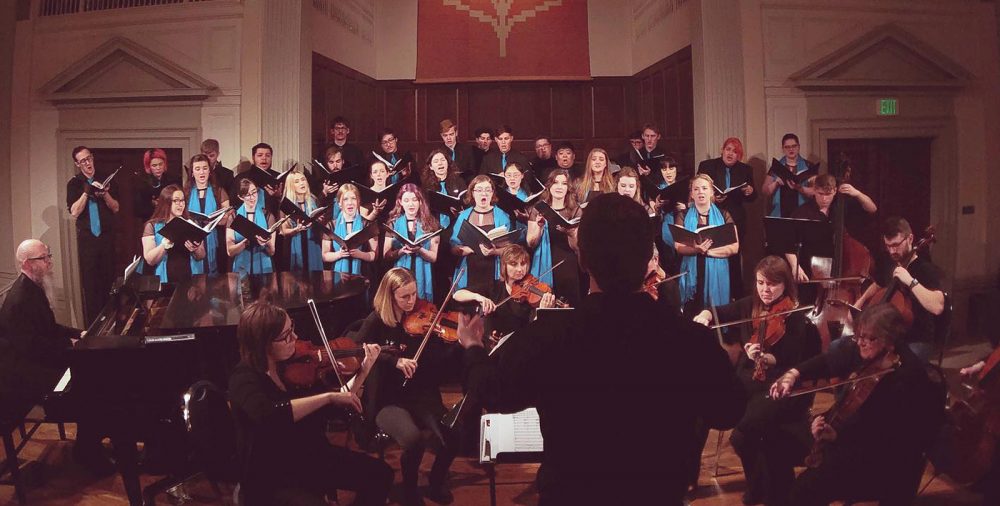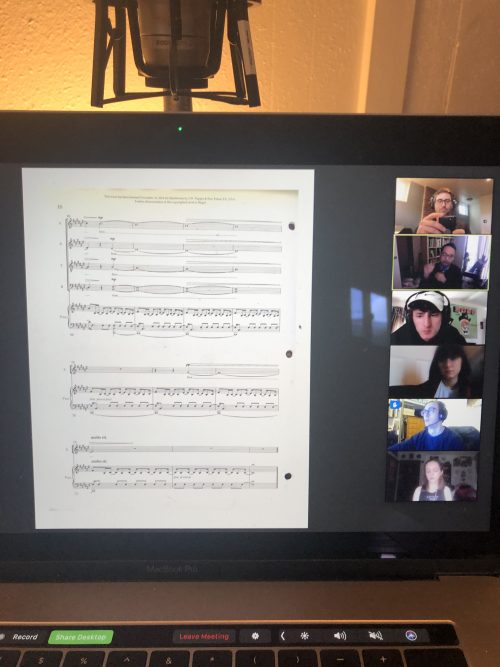This content was published: April 13, 2020. Phone numbers, email addresses, and other information may have changed.
The music plays on as Rock Creek choirs, Sylvania music classes continue in virtual world
Story by Alfredo Moreno & James Hill.
Much of the beauty and power of a choir comes from how it brings a large, diverse group of people together in vocal harmony. In recent years, few in the Portland metro area have provided a better showcase of that concept than Portland Community College’s acclaimed choirs at the Rock Creek Campus.
The national social distancing effort and PCC’s subsequent transition to online classes and remote operations have posed a distinct challenge to the college’s academic and student support programs and, in particular, ensemble groups like the college’s chamber and concert choirs. Like their peers throughout the district, however, the choir faculty and students have met the challenge and have charged ahead into this new world of learning, performing and community building.
COVID-19 Resources
- PCC has moved to remote operations for spring term. The college has put together resources for students and staff related to the college providing online classes and services.
Music instructor Samuel Barbara, who is the director of Rock Creek’s Choral and Vocal Studies, said that in the face of turmoil it was important to keep the choirs unified and maintain a consistent schedule. To do so, Barbara turned to music instructor Jason Sabino, who helped set up the new class and rehearsal format utilizing video conferencing.
The choir and vocal jazz classes continue to meet at their normal times, and students use online part tracks to learn their music, then warm up and sing together. They also engage in group sight-reading practice and critical listening activities.
Despite their distance, Barbara said reconnecting in the virtual space quickly turned uncertainty into joy.
“Students found it to be a very moving experience to listen carefully to choral music together and comment in an online forum,” he said. “There is something about hearing a piece they had sung before, knowing that they can’t be together; that made it more powerful.”
PCC student Trevor Winder, who is wrapping up his first year with the choir, said the success of the early meetings have given him much needed optimism during a trying time.
“It was a shock to me how our choir was going 100 miles an hour, then was forced to a complete stop,” Winder said. “However, I felt incredibly encouraged meeting with everyone, and I am so proud of the faculty and how quickly and efficiently they have adjusted. I’m looking forward to a wonderful term online with my friends.”
Barbara said that while he looks forward to gathering in person and resuming the choirs’ robust performance schedule, he believes there is a silver lining to this unique experience that all musicians can benefit from.
“I think this is going to help us all learn not to take what we do as ensemble musicians for granted, because it truly is special to make music with people,” he said. “These are strange times, indeed, but we must carry on in song.”
Sylvania Music Taps Creativity
At the Sylvania Campus, music instructor John Mery reports that virtual classes have been going better than expected. Music faculty have been hard at work to add more online content to the courses the program offers.
“We’ve been working with software manufacturers to grant students temporary licenses for specialized music production applications,” Mery said. “And we’ve partnered with a local vendor to get loaner portable pianos for our class piano students.”
Mery teaches music theory, applied keyboard skills, survey and lecture courses, as well as provides private music lessons. He said the tight timeline faculty have had to deal with was the biggest challenge because of the sheer amount of content that needs to be created for the new modality. In addition, faculty had to learn the online platforms and figure out how to engage students with the same effectiveness as face-to-face classes.
“Students have adapted remarkably well,” Mery continued. “The most fun has been meeting with students each week. I really look forward to seeing them, albeit virtually.”


